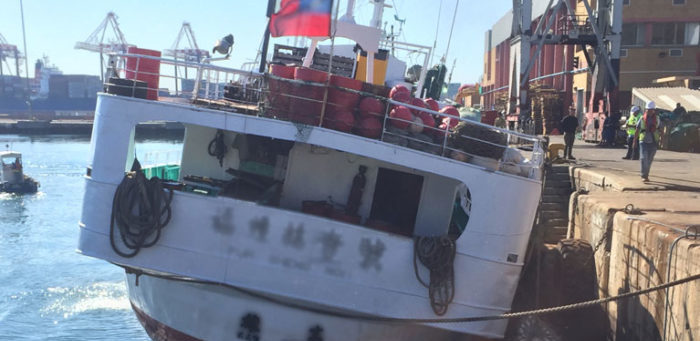The Environmental Justice Foundation (EJF) has urged the Taiwanese government to review its fisheries law for ensuring a more effective implementation of working standards in vessels overseas. This comes after the foundation documented gross human rights violations and serious illegal fishing offences aboard a Taiwanese vessel, which became the first in the world to be detained over the summer for violating new international standards of decent work in fishing.
The 380 GT vessel was detained by South African authorities in Cape Town in late June, following complaints by the crew about working conditions, under the International Labour Organization’s (ILO’s) Work in Fishing Convention C188.
Crew members informed EJF of beatings from the captain, 22-hour working days and serious injuries to crew working in dangerous conditions. The crew were also “lucky” if they got six hours rest a day. Medical supplies were lacking and safety equipment was insufficient. Furthermore, salaries were below the Taiwanese minimum wage.
They also reported that the vessel had illegally finned sharks, including endangered hammerheads.
Additionally, South African officials cited a lack of work agreements and crew list, rotten lifebuoys, missing anchors and generally poor health and safety conditions.
At the time of its detention in Cape Town, a Taiwanese Fisheries Agency official visited the ship but made a series of basic errors that led to the release of the vessel. The official reportedly issued questionnaires to crew in the presence of the captain – who allegedly beat crew regularly – and the crew said afterwards that they did not know who was giving them the questionnaires or what protections they would have if they reported the true conditions on the vessel. In addition, no interpreter was present despite some crew being unable to read the questionnaires.
Following this, Taiwan’s Fisheries Agency issued a statement saying that the vessel only needed a few repairs, and it was allowed to leave Cape Town, but the situation did not change, according to EJF. At this point however, amidst growing attention from NGOs and the media, most of the crew were sent to their home countries, where EJF made contact with them.
To eradicate human rights abuses from its fleet, EJF has called Taiwan to review the measures put in place by the Fisheries Agency to detect and react to such abuse, immediately implement fit-for-purpose, standardised procedures and ensure they are robustly implemented in Taiwan and overseas.
As one of the world’s most advanced economies, Taiwan has the means and technology to put a stop to these abuses in its fisheries,
…says EJF Deputy Director Max Schmid.
Human rights abuse is a key area of concern for fishing and maritime industry. This week, Human Rights at Sea published a facts sheet to help maritime businesses understand their business and human rights requirements.






























































